|
|
|
Sort Order |
|
|
|
Items / Page
|
|
|
|
|
|
|
| Srl | Item |
| 1 |
ID:
159465
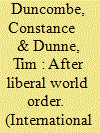

|
|
|
|
|
| Summary/Abstract |
In recent years claims about the end times of the liberal world order have gathered force, with the talk of order giving way to disruption. While there are different accounts of these disruptive dynamics and their causes, it is nevertheless a rare moment in International Relations when all mainstream theories concur that the hegemony of the liberal world order is over and that there is considerable uncertainty about the global architecture that will take its place. Yet claiming that the liberal world order is in trouble is just a starting-point—a deeper account is needed to show how each interrelated element ‘hangs together’. We examine two interrelated patterns to liberal world ordering—internationalism and imperialism. After unpacking each of these interrelated ideas which constitute liberal world order, the narrative will focus on the politics and practice of humanitarianism. Humanitarianism is, of course, deeply intertwined with liberal assumptions about an ethic of care for peoples who are either at risk of, or worse still suffering from, large-scale natural disasters and politically-induced atrocities. Our inference is that the condition of humanitarianism provides a good indication of the state of the liberal world order—its limits and possibilities.
|
|
|
|
|
|
|
|
|
|
|
|
|
|
|
|
| 2 |
ID:
157969
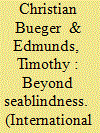

|
|
|
|
|
| Summary/Abstract |
This article examines the rise of maritime security in concept and practice. We argue that developments in the maritime arena have flown beneath the radar of much mainstream international relations and security studies scholarship, and that a new agenda for maritime security studies is required. In this article we outline the contours of such an agenda, with the intention of providing orientation and direction for future research. Our discussion is structured into three main sections, each of which outlines a core dimension of the maritime security problem space. We begin with a discussion of the issues and themes that comprise the maritime security agenda, including how it has been theorized in security studies to date. Our argument is that the marine environment needs to be understood as part of an interlinked security complex, which also incorporates strong connections between land and sea. Second, we examine the ways in which maritime security actors have responded to these challenges in practice, focusing on issues of maritime domain awareness, coordination of action, and operations in the field. Third, we turn to the mechanisms through which the new maritime security agenda is being disseminated to local actors through a process of devolved security governance. We focus particularly on efforts to distribute knowledge and skills to local actors through capacity building and security sector reform. In the conclusion, we outline the future challenges for maritime security studies that follow from these observations.
|
|
|
|
|
|
|
|
|
|
|
|
|
|
|
|
| 3 |
ID:
170400
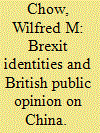

|
|
|
|
|
| Summary/Abstract |
Many studies have explored the importance of public opinion in British foreign policy decision-making, especially when it comes to the UK's relations with the United States and the European Union. Despite its importance, there is a dearth of research on public opinion about British foreign policy towards other major players in the international system, such as emerging powers like China. We have addressed this knowledge gap by conducting a public opinion survey in the UK after the Brexit referendum. Our research findings indicate that the British public at large finds China's rise disconcerting, but is also pragmatic in its understanding of how the ensuing bilateral relations should be managed. More importantly, our results show that views on China are clearly split between the two opposing Brexit identities. Those who subscribe strongly to the Leave identity, measured by their aversion to the EU and antipathy towards immigration, are also more likely to hold negative perceptions of Chinese global leadership and be more suspicious of China as a military threat. In contrast, those who espouse a Remain identity—that is, believe that Britain would be better served within the EU and with more immigrants—are more likely to prefer closer engagement with China and to have a more positive outlook overall on China's place within the global community.
|
|
|
|
|
|
|
|
|
|
|
|
|
|
|
|
| 4 |
ID:
170392


|
|
|
|
|
| Summary/Abstract |
Marysia Zalewski's work has taught us, as a collective of feminist scholars, to be cautious of neat instruction manuals and coherently set out plans of action; of claims to sure knowledge about danger, violence, and its subjects and remedies; of the fanfare of grand arrivals; and of the quieter staking of ground that has been seemingly won. Zalewski has persistently reminded us in different ways that we/she does ‘not even know what gender is or does’. Far from a flippant response to the emptiness of gender mainstreaming policies, this seemingly simple statement instead serves as a glaring post-it note on the margins of our texts about International Relations theory, feminism, sex/gender and violence— both those that we read, as well as those that we write. However, this lesson is often forgotten in our rush to understand and establish gendered harms as valid and important, and to seek their redress. Gleaning insights from Zalewski's work, this article critically considers possible responses to the 2018 Nobel Peace Prize. Its aim is not to delve into a discussion of the politics or effects of the Peace Prize as such, but to instead use the 2018 Peace Prize as a marker—a moment to consider the possibility for critique in relation to sexual violence.
|
|
|
|
|
|
|
|
|
|
|
|
|
|
|
|
| 5 |
ID:
159464
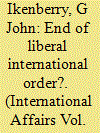

|
|
|
|
|
| Summary/Abstract |
These are not happy times for liberal internationalists. No one can be sure how deep the crisis of liberal internationalism runs. However, in what follows, I argue that despite its troubles, liberal internationalism still has a future. The nature of the crisis is surprising. The threats to liberal internationalism were expected to come from rising non-western states seeking to undermine or overturn the postwar order. In the face of hostile, revisionist states, the United States and Europe were expected to stand shoulder to shoulder to protect the gains from 70 years of cooperation. But, in fact, liberal internationalism is more deeply threatened by developments within the West itself. The centrist and progressive coalitions that lay behind the postwar liberal order have weakened. Liberal democracy itself appears fragile and polarized, vulnerable to far right populism and backlash politics. In recent decades, the working and middle classes in advanced industrial democracies—the original constituencies and beneficiaries of an open and cooperative international order—have faced rising economic inequality and stagnation. Within the West, liberal internationalism is increasingly seen, not as a source of stability and solidarity among like-minded states, but as a global playing field for the wealthy and influential. Liberal internationalism has lost its connection to the pursuit of social and economic advancement within western countries.
|
|
|
|
|
|
|
|
|
|
|
|
|
|
|
|
| 6 |
ID:
183861
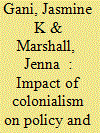

|
|
|
|
|
| Summary/Abstract |
Is there an academic–policy divide, and does that gap need to be bridged? For decades, International Relations (IR) scholars have reflected on their roles and responsibilities towards the ‘real world’, while policy-makers have often critiqued the detachment of academic research. In response, there have been increased calls for academics to descend from their ‘ivory tower’. However, the articles in this 100th anniversary special issue of International Affairs interrogate this so-called theory–policy divide and problematize the exchange of knowledge between academics and practitioners, highlighting the colonial underpinnings of their historical entanglements. In this introductory article we bring together the core arguments of the special issue contributions to delineate three prominent dynamics in the academic–practitioner nexus: the role of academia as a supplier of knowledge for colonial policies; the influence of imperial practice and policy-makers in shaping IR and academic knowledge production; and the contestation from academics and/or practitioners against racial hierarchies in knowledge production and policy-making. Confronting the exclusions, amnesias and denials of colonialism in the theory and practice of International Relations is the necessary first step in any process of repair towards a more just and viable politics.
|
|
|
|
|
|
|
|
|
|
|
|
|
|
|
|
| 7 |
ID:
161723
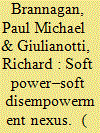

|
|
|
|
|
| Summary/Abstract |
There are four areas in which soft power is open to critical scrutiny. First, research has centred on large and/or developed nations, notably in North America, Europe, east Asia and the BRICs. Second, scholars have called for greater clarity of the concept, noting that it lacks clear explanation of how instances of attraction equate to various power outcomes. Third, others suggest Joseph Nye developed an Americanized-centric understanding of soft power, and hence a narrow account of what constitutes ‘attraction’. Finally, research has failed to examine how states' soft power attempts can backfire, leading to what we call ‘soft disempowerment’. Drawing on the case of Qatar—with a particular focus on the state's acquisition of the 2022 FIFA World Cup finals—we seek to offer responses to these criticisms. We do this by refining the concept of soft power to take account of variegated power outcomes, and by focusing on a small state and a non-American context, in order to explore the intersections of soft power and soft disempowerment. In doing so, we introduce the ‘soft power–soft disempowerment nexus’ which, we go on to argue, affords an analytical framework for examining how soft power works and how it may be hampered through negative international scrutiny.
|
|
|
|
|
|
|
|
|
|
|
|
|
|
|
|
| 8 |
ID:
155088


|
|
|
|
|
| Summary/Abstract |
The study of international relations in or of Asia is no longer atheoretical, as was the case only three decades ago, when the Pacific Review was founded. But how serious are the efforts to study the international relations of Asia theoretically? Some Western scholars argue that writings on Asian International Relations (IR) are still peripheral to the major concerns and debates among IR theories such as realism, liberalism, and constructivism. The ‘indigenization’ of Asian IR theory remains limited by, among other factors, a tendency among local scholars to rely heavily on Western theories, and the close academia-officialdom nexus in the region that inhibits theoretical work. But this essay argues that Asia offers an opportunity to IR theory for broadening itself and shed its hitherto Westerncentrism, especially at a time of a ‘global’ turn in IR (global IR). Theoretical writings on Asian IR are already making a difference by exposing the limitations of mainstream IR theories in the regional context. And they have the potential to offer new and alternative concepts that are more contextually grounded and relevant for Global IR. At the same time, there remain some important conditions that must be met before theoretical writings on Asian IR can make further progress and realize their full potential.
|
|
|
|
|
|
|
|
|
|
|
|
|
|
|
|
|
|
|
|
|